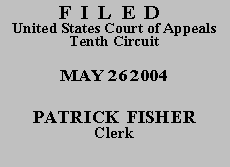

| BENARD WITHERSPOON;
JAMES WITHERSPOON;
FRANKIE L. WITHERSPOON;
ESSIE WITHERSPOON;
ULYSSES WASHINGTON;
MARY WASHINGTON;
BOBBY WITHERSPOON;
LATONYA WITHERSPOON;
GEORGE WITHERSPOON;
KENDRA WITHERSPOON,
Plaintiffs-Appellants, and PAULA PORTER; LUE CYNTHIA HALL; GARNSTIME SHELTON; NEW JERUSALEM LOCAL CONGREGATION, Plaintiffs, v. DOUGLAS S. MILLER; DANIEL H. DIEPENBROCK; GRANT SELLENBERGER; LINDA POWELL GILMORE; MILLER & DIEPENBROCK, PA, Defendants-Appellees. |
|
Plaintiffs-appellants, proceeding pro se, challenge the district court's judgment dismissing their claims brought under 42 U.S.C. §§ 1981, 1982, 1983, 1985 and 1986, Title VII, and Kansas state law.(1) The district court held that plaintiffs failed to state a claim upon which relief can be granted on their federal claims, that diversity of citizenship was lacking because all of the parties except one defendant resided in the State of Kansas, and that it did not have supplemental jurisdiction over the state-law claims because federal jurisdiction had not been established. Accordingly, the district court dismissed the case for lack of subject-matter jurisdiction, under Fed. R. Civ. P. 12(b)(1), and for failure to state a claim, under Rule 12(b)(6). We exercise jurisdiction pursuant to 28 U.S.C. § 1291 and affirm.
Defendants are attorneys at law. Plaintiffs engaged defendants to represent them in litigation filed in a Kansas state court. Dissatisfied with defendants' representation and the outcome of the state-court litigation, plaintiffs filed the underlying federal lawsuit. They sought relief for violations of federal civil-rights statutes, as well as for legal malpractice, malice, fraud, ineffective counseling, obstruction and other claims.
We review de novo an order dismissing a complaint under either Rule 12(b)(1) or 12(b)(6), using the same standard applied by the district court. Ordinance 59 Ass'n v. United States Dep't of Interior Sec'y, 163 F.3d 1150, 1152 (10th Cir. 1998). "We accept as true all well-pleaded facts, as distinguished from conclusory allegations, and view those facts in the light most favorable to the nonmoving party." Maher v. Durango Metals, Inc., 144 F.3d 1302, 1304 (10th Cir. 1998). Dismissal of a complaint pursuant to Rule 12(b)(6) will be upheld only if "it appears beyond doubt that the plaintiff can prove no set of facts in support of his claim which would entitle him to relief." Conley v. Gibson, 355 U.S. 41, 45-46 (1957). Because plaintiffs are representing themselves on appeal, their pleadings will be liberally construed. See Haines v. Kerner, 404 U.S. 519, 520-21 (1972).
We have carefully reviewed the record on appeal, as well as the briefs submitted by the parties. Applying the standards set out above, we affirm the judgment of dismissal for substantially the same reasons stated by the district court in its carefully drawn memorandum and order dated June 4, 2003.
The judgment of the district court is AFFIRMED. The mandate shall issue forthwith.
Entered for the Court
Circuit Judge
*. This order and judgment is not binding precedent, except under the doctrines of law of the case, res judicata, and collateral estoppel. The court generally disfavors the citation of orders and judgments; nevertheless, an order and judgment may be cited under the terms and conditions of 10th Cir. R. 36.3.
1. Plaintiffs-appellants' appellate briefs contain additional federal grounds for their claims, but we do not consider them because they were not presented to the district court. See Wilburn v. Mid-South Health Dev., Inc., 343 F.3d 1274, 1280 (10th Cir. 2003).